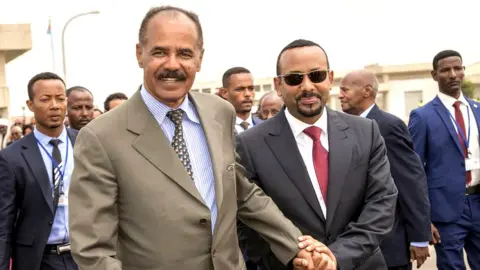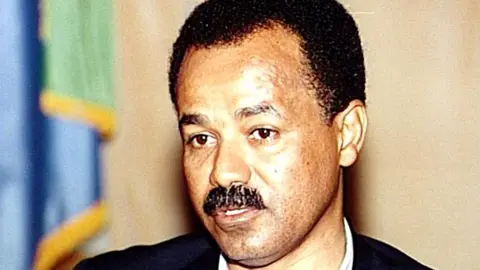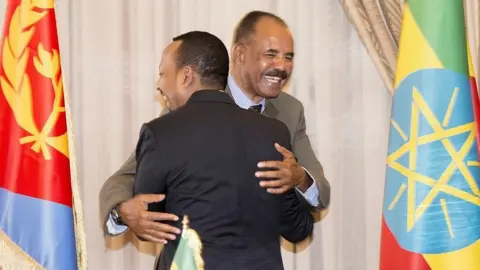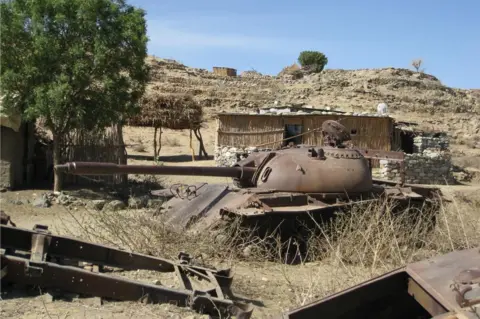Eritrea President Isaias Afwerki 'both charismatic and brutal'
 Reuters
ReutersSaturday's visit of Eritrea's President Isaias Afwerki to Addis Ababa, the capital of its neighbour Ethiopia, is a remarkable turnaround for the 72-year-old independence leader who has been isolated diplomatically and seen as secretive and paranoid.
A few weeks ago, Ethiopia and Eritrea were enemies, as they had been for the past two decades, yet now they are behaving as if they are the best of friends.
Ethiopia's Prime Minister Abiy Ahmed is set to reciprocate the welcome he received in Eritrea's capital, Asmara, last Sunday. There, the two men embraced warmly and declared an end to the state of war.
This is a new phase in the president's relationship with Ethiopia, which has largely defined his life.

He was born in 1946 in Asmara, which was, at the time, under British administration. In 1962 it was annexed by Ethiopia.
In 1965 he went to Addis Ababa to study engineering at Haile Selassie University but left a year later to join the Eritrean Liberation Front (ELF), which was fighting for independence.
Mr Isaias was among the first group of fighters to travel to China in 1967 for military and ideological training. On his return he, along with others, agitated for change within the ELF but then went on to form a new party, the Eritrean People's Liberation Front.
'Renaissance leader'
After a decades-long David-and-Goliath struggle, Eritrea held a referendum on independence in 1993, which was approved by 99% of voters.
Mr Isaias remains the only president the country has known.
In the early years he was hailed as a new type of African president. Then-US President Bill Clinton referred to him as a "renaissance African leader".
At an Organisation of African Unity summit in Cairo in 1993, he blasted fellow heads of state for staying in power for too long and rejected a cult of personality.

More about Ethiopia and Eritrea:

In Ethiopia, there used to be portraits of Marxist military ruler Mengistu Hailemariam on display everywhere and on coming to power, Mr Isaias made a conscious effort to reject this approach.
Nevertheless he was greatly revered in Eritrea. He appeared austere, serious and scary from a distance, but some who met him had a different impression.
They speak about a helpful and supportive man who had a good sense of humour and made people laugh.
His reputation has since undergone a transformation. He has never been elected, has stopped any attempts to hold an election and in a 2009 confidential message from the US ambassador in Eritrea, he was described as an "unhinged dictator".
Ambassador Ronald K McMullen wrote, in a document released in a tranche of Wikileaks cables, that President Isaias was "cruel and defiant".
In the same year, the African Union urged the United Nations to sanction Eritrea over its alleged support of Islamist militants in Somalia. A charge that Eritrea denied.
 Reuters
ReutersSome see his 2001 jailing of prominent leaders of the independence movement, who had been critical of his presidency, as a turning point.
The detention of journalists and anyone who appeared to be an opponent gathered pace from then on. He also shut down fledgling newspapers which were beginning to find their voice.
But he had given indications of this type of behaviour before.
He was always charismatic and persuasive but was also "quite merciless and vindictive," says Andebrhan Welde Giorgis, a former Eritrean ambassador and struggle comrade of Mr Isaias, who now lives in exile.

During the independence war, the need for solidarity when the rebel fighters were outnumbered and outgunned by Ethiopian government forces meant that criticism of him was kept in check, Mr Andebrhan adds.
After independence, the expectation was that a democratic government would be established, but although a new constitution was drawn up in 1997, it was never enacted.
The president used the 1998-2000 border war with Ethiopia as an excuse to suspend any moves towards democracy and they were never restarted.
Then the failure of Ethiopia to agree to a ruling by an independent border commission meant that Eritrea remained on a war footing and led to the indefinite conscription of tens of thousands of people.
'Split personality'
Mr Isaias went on to "personalise power and having personalised power he abused it to the maximum", former Eritrean ambassador Mr Andebrhan says.
He speaks about the president as if he has a split personality. On the one hand there is the inspirational leader and then there is the "dark and brutal" side.
So how is this squared with the jovial scenes when Mr Isaias met the Ethiopian prime minister?
"He was acting. Most dictators are good actors and he's able to suck people in," Mr Andebrhan says.
While seasoned observers of Eritrea welcome the progress towards peace with Ethiopia, there are those who remain sceptical that he will bring change at home.
Many want to know about the thousands imprisoned before they can be optimistic about the future of the country.
